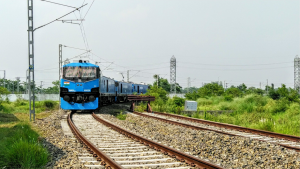 India’s Ministry of Railways and the Research Designs & Standards Organisation (RDSO) have officially approved Alstom’s WAG 12B electric locomotives to run at a maximum speed of 120 km/h.
India’s Ministry of Railways and the Research Designs & Standards Organisation (RDSO) have officially approved Alstom’s WAG 12B electric locomotives to run at a maximum speed of 120 km/h.
Earlier this year, Indian Railways began inducting the WAG 12B e-locos, which are the most powerful locomotives to run on Indian tracks. Cumulatively, these electric locomotives have already clocked over 1 million kilometres, providing a significant fillip to the country’s freight logistics landscape.
These electric locomotives will allow faster and safer movement of heavier freight trains capable to haul 6000 tonnes at a top speed of 120 km/h. Planned to be deployed for operations on major freight routes of Indian Railways including the Dedicated Freight Corridors (DFCs), they are expected to increase the average speed of freight trains in India by at least 20-25 km/h.
“The approval from RDSO is indeed a matter of pride for all of us at Alstom and a testimony of our technical expertise in partnership with the Indian Railways. In line with India’s push towards self-reliance, we have successfully leveraged our local engineering and manufacturing capabilities,” Alain Spohr, Managing Director, Alstom India & South Asia said.
The WAG 12B electric locomotives are equipped with Insulated Gate Bipolar Transistors (IGBT) based propulsion technology allowing savings in energy consumption thanks to the regenerative braking system. “The technology is also helpful towards making the acceleration process more efficient by reducing the heat generation and traction noise. Additionally, this move will not only bring down operational costs, but also reduce the congestion faced by Indian Railways”, Alain Spohr explained.
Alstom is committed to support Indian Railways achievement to reduce the carbon footprint and to adopt cleaner technologies towards a greener railway system.
The French manufacturer is deeply involved in India’s rail development and the Make-in-India initiative.
In 2015, the Ministry of Railways and Alstom signed a EUR 3.5 billion contract for the construction of 800 double-section, 12000-horsepower electric locomotives for freight transport services. The contract also included the associated maintenance for a period of 11 years. The contract also included the set-up of a manufacturing plant at Madhepura (Bihar) for the locomotives and two maintenance depots at Saharanpur (Uttar Pradesh) and Nagpur (Maharashtra).
Share on:



